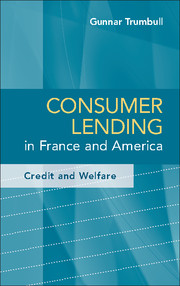Crossref Citations
This Book has been
cited by the following publications. This list is generated based on data provided by Crossref.
Ferretti, Federico
2015.
Credit Bureaus Between Risk-Management, Creditworthiness Assessment and Prudential Supervision.
SSRN Electronic Journal,
Gonzalez, Felipe
2015.
Where are the Consumers?.
Cultural Studies,
Vol. 29,
Issue. 5-6,
p.
781.
Yudin, G.
2015.
The Moral Nature of Debtand the Making of Responsible Debtor.
Voprosy Ekonomiki,
p.
28.
Heuer, Jan-Ocko
2015.
Private Überschuldung und Sozialpolitik: Varianten der staatlichen Regulierung von Verbraucherinsolvenz und Restschuldbefreiung.
Zeitschrift für Sozialreform,
Vol. 61,
Issue. 3,
p.
315.
Lewin-Epstein, Noah
and
Semyonov, Moshe
2016.
Household debt in midlife and old age: A multinational study.
International Journal of Comparative Sociology,
Vol. 57,
Issue. 3,
p.
151.
Quinn, Sarah
2017.
“The Miracles of Bookkeeping”: How Budget Politics Link Fiscal Policies and Financial Markets.
American Journal of Sociology,
Vol. 123,
Issue. 1,
p.
48.
Aspers, Patrik
and
Beckert, Jens
2017.
Handbuch der Wirtschaftssoziologie.
p.
215.
Hájek, Martin
and
Samec, Tomáš
2017.
Discourses of Thrift and Consumer Reasonability in Czech State-Socialist Society.
Czech Sociological Review,
Vol. 53,
Issue. 6,
p.
805.
Lux, Martin
Hájek, Martin
and
Kážmér, Ladislav
2017.
Application of Agent-based Modelling for Estimation of Norm-based Dynamics of Housing Systems.
Housing, Theory and Society,
Vol. 34,
Issue. 4,
p.
379.
Nelson, Dylan K.
2017.
The Wiley‐Blackwell Encyclopedia of Social Theory.
p.
1.
Sala, Adrienne
2017.
The Japanese consumer finance market and its institutional changes since the 1980s.
Japan Forum,
Vol. 29,
Issue. 3,
p.
375.
Krippner, Greta
Lemoine, Benjamin
and
Ravelli, Quentin
2017.
The Politics of Financialization.
Revue de la régulation,
Vol. 22,
Issue. ,
Krippner, Greta R.
2017.
Democracy of Credit: Ownership and the Politics of Credit Access in Late Twentieth-Century America.
American Journal of Sociology,
Vol. 123,
Issue. 1,
p.
1.
Aldohni, Abdul Karim
2017.
The UK New Regulatory Framework of High-Cost Short-Term Credit: Is There a Shift Towards a More “Law and Society” Based Approach?.
Journal of Consumer Policy,
Vol. 40,
Issue. 3,
p.
321.
Rona-Tas, Akos
and
Guseva, Alya
2018.
Consumer Credit in Comparative Perspective.
Annual Review of Sociology,
Vol. 44,
Issue. 1,
p.
55.
Micklitz, Hans-W
2018.
The Politics of Justice in European Private Law.
Dwyer, Rachel E.
2018.
Credit, Debt, and Inequality.
Annual Review of Sociology,
Vol. 44,
Issue. 1,
p.
237.
Zaki, Mary
2018.
Interest Rates: Prices Hidden in Plain Sight.
SSRN Electronic Journal ,
Bittmann, Simon
2019.
De l’« usure » en Amérique.
Genèses,
Vol. n° 117,
Issue. 4,
p.
49.
Bittmann, Simon
2019.
Une économie raciale de l’obligation : loan sharks et travailleurs afro-américains au début du XXe siècle.
Sociologie du travail,
Vol. 61,
Issue. 4,





